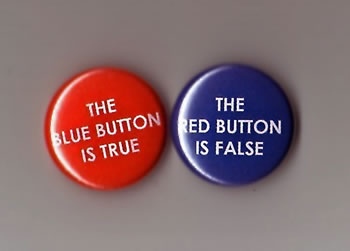Difference between Paradox and Oxymoron
Key Difference: An oxymoron is often a set of two or more words that are contradictory in nature, yet somewhat make sense when put together, especially in the common language use of the terms. A paradox, on the other hand, creates a confusing situation that cannot really exist, as nothing can be both true and false at the same time.
 The terms Paradox and Oxymoron are often thrown around, especially when talking about ideas that are opposite to each other. However, these terms are often used incorrectly, because both terms, paradox and oxymoron, tend to refer to similar concepts. Both infer the concept of contradictory things or ideas. Nevertheless, the two words are actually different and are meant to be used differently.
The terms Paradox and Oxymoron are often thrown around, especially when talking about ideas that are opposite to each other. However, these terms are often used incorrectly, because both terms, paradox and oxymoron, tend to refer to similar concepts. Both infer the concept of contradictory things or ideas. Nevertheless, the two words are actually different and are meant to be used differently.
A paradox is type of statement that contains contradicting statements that are both true and false at the same time. Let’s consider an example of a paradox; "This statement is false." This statement is a paradox because if the statement is true, then it must be false; but if it is taken as false, then it must be true. When a statement is both simultaneously true and false, then it is a paradox.
An oxymoron is a commonly used phrase that that uses two words together which are opposite or contradictory to each other. For example: icy hot, or ill health are just two of the many different oxymoron in common usage. Both refer to completely different things that are directly contradicting to each other, such as icy and hot are opposites of each other, similarly ill and health are opposite to each other. However, these opposite words when put together make sense and are commonly used without much thought.
In fact, the word oxymoron is an oxymoron in itself. The word is derived from two Greek works, ‘oksús’ and ‘mōros’; the former means ‘sharp’ and ‘pointed’, whereas the latter means ‘dull’ and foolish’. The two words are complete opposite of each other, which should not be used together, but still are.
 Both are types of figurative language, i.e. they are used to indicative something figuratively and are not meant to be taken literally, as they would not make much sense literally. Despite the fact that they do not make any literal sense, both are common aspects of language and are used regularly. However, it can be said that an oxymoron is used more commonly by the general public, than a paradox, which most people tend to find confusing.
Both are types of figurative language, i.e. they are used to indicative something figuratively and are not meant to be taken literally, as they would not make much sense literally. Despite the fact that they do not make any literal sense, both are common aspects of language and are used regularly. However, it can be said that an oxymoron is used more commonly by the general public, than a paradox, which most people tend to find confusing.
It may be somewhat confusing to tell them apart. However, an oxymoron is often a set of two words that are contradictory in nature, yet somewhat make sense when put together, especially in the common language use of the terms. A paradox, on the other hand, creates a confusing situation that cannot really exist, as nothing can be both true and false at the same time.
Comparison between Paradox and Oxymoron:
|
|
Paradox |
Oxymoron |
|
Definition (Oxford Dictionaries) |
A seemingly absurd or contradictory statement or proposition which when investigated may prove to be well founded or true. A statement or proposition which, despite sound (or apparently sound) reasoning from acceptable premises, leads to a conclusion that seems logically unacceptable or self-contradictory. |
A figure of speech in which apparently contradictory terms appear in conjunction |
|
Concept |
Sentence or idea |
Phrase |
|
Type |
Figurative language |
Figurative language |
|
Etymology |
Mid-16th century (originally denoting a statement contrary to accepted opinion): via late Latin from Greek paradoxon ‘contrary (opinion)’, neuter adjective used as a noun, from para- ‘distinct from’ + doxa ‘opinion’. |
Mid-17th century: derived from the Greek ὀξύς oksús "sharp, keen, pointed" and μωρός mōros "dull, stupid, foolish", as it were "sharp-dull", or "clever-dumb" |
|
Example |
You can save money by spending it. I'm nobody. "What a pity that youth must be wasted on the young." - George Bernard Shaw Wise fool Bittersweet "I can resist anything but temptation."-Oscar Wilde I'm a compulsive liar- am I lying when I say that? |
adult children awfully nice all alone sadly happy bitter sweet civil war clearly misunderstood cruel kindness visible darkness even odds |
Reference: Oxford Dictionaries (Paradox and Oxymoron), Wikipedia (Paradox and Oxymoron), Thought Co., Pediaa Image Courtesy: byrdseed.com, inglesnarede.com.br









Add new comment